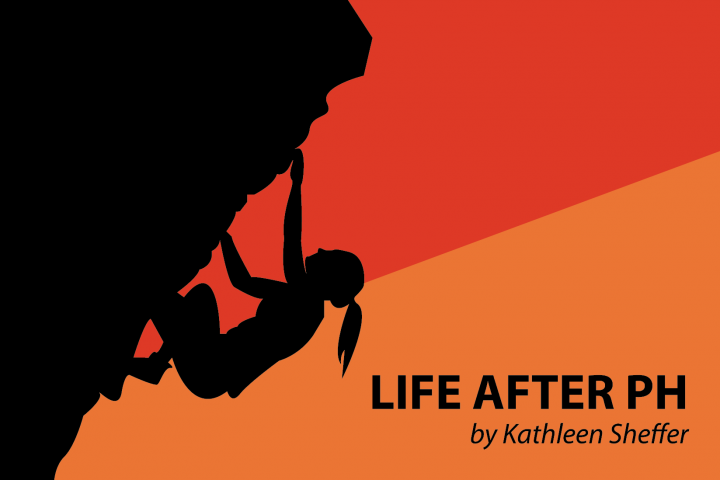I Am a PH Patient Without PH

(Photo by Ren Reed)
When asked to help launch the Pulmonary Hypertension News Forums, I was honored, excited … and I felt like a fraud. “I don’t even have PH, anymore!” I reasoned.
Surgeons wiped a 16-year-old diagnosis from my record when they pulled my birth heart and lungs from my chest. Transplant educators tell us that a transplant is not a cure — instead, it’s like trading one chronic illness for another. I have a new disease and increased risk for others. And I no longer have pulmonary hypertension.
I’m still figuring out what that means for me. I have been a PH patient since I was 6 years old. The disease informed the majority of my life and that of my younger sister. My family attended eight biennial PH Conferences while I had the disease. We ran awareness campaigns and fundraisers for PHA. Each of us has lifelong friends in the PH community.
My friend Kendra and I often compared our flushed palms and purple lips, swapping stories about insensitive comments from peers. Now when we are together, I am acutely aware of my dissimilarly pink (oxygenated) skin.
While building the PH News Forums, I did some research to provide content for discussion topics. I needed to catch up on the advancements I’d missed in the time I spent focused on learning the ins and outs of transplant.
Reading through a list of approved therapies, I saw medications that were not available until it was too late for me. There are medications available now that I heard about at conferences and asked my doctors about but never got a chance to take. This brings both disappointment and optimism for me. Disappointment that research and FDA approval couldn’t keep up with the aggressive nature of my pulmonary hypertension. But optimism for other patients who will have access to new therapies as the disease gains recognition and understanding.
Despite all the wonderful ways that having a transplant has enriched my life, in some moments I still feel like somehow I failed by having to choose the last resort option. Transplant is not Plan B — it’s Plan F. “F” for failure. Really, it’s probably more like Plan Z because, boy, did we try a lot of alternative plans. While doing my research, I came across this list of the classes of medications used to treat PH. I realized I have taken forms of all seven of them. My doctors, family, friends, and I threw everything we had at beating PH.
My hope for a cure remains. I want to see my friends with PH cured and an end to a horrible disease. But there’s still a small part of me that will shout, “It’s not fair!” because I face the complications of life after transplant, without hope of benefitting from a cure for PH.
I still wear my PH T-shirts, contribute to Facebook support groups, and now our forums. I do what I can to support my friends with PH, putting my new energy and abilities to use: Last fall, I pushed my friend in a wheelchair all over Disneyland. That was more of a thrill than any ride we went on. Twice since my transplant, I’ve speed-walked (turns out running sucks) Stanford’s annual 5K Race Against PH. Through the PH News Forums, I hope to channel more of my newly gifted energy into helping the community that supported my family and me.
Knowing that I have experience with every pathway to treat PH gave me some confidence to moderate the forums. Sixteen years with the disease makes me a long-term survivor, even if ultimately transplantation became the only way for me to survive it.
Initially, I felt like I lost parts of my identity with my transplant. My interactions with other patients and caregivers in the forums last week reminded me that though I no longer have the disease, pulmonary hypertension has shaped me. I feel immediately connected to other patients who express their feelings and experiences. Though my shortness of breath, blue lips, and infusion pump vanished, the unspoken understanding between my fellow survivors and me remains.
I may no longer have PH, but I am still a PH patient at heart. Well, not at heart I suppose. I’m using the expression figuratively, OK? Sheesh.
***
Note: Pulmonary Hypertension News is strictly a news and information website about the disease. It does not provide medical advice, diagnosis, or treatment. This content is not intended to be a substitute for professional medical advice, diagnosis, or treatment. Always seek the advice of your physician or other qualified health provider with any questions you may have regarding a medical condition. Never disregard professional medical advice or delay in seeking it because of something you have read on this website. The opinions expressed in this column are not those of Pulmonary Hypertension News or its parent company, Bionews Services, and are intended to spark discussion about issues pertaining to pulmonary hypertension.









Joanne
Another great article Kathleen. I hope you'll stay an active, dedicated member of the PH community and I know our community will continue to champion organ donation and push for better understanding of life after transplant. We're two spokes of the same wheel :-). I'm posting your article on our support group page-thank you SO much for sharing your journey.
Kathleen Sheffer
Thank you, Joanne. I completely agree that the PH and transplant communities are inseparable. Do you mind sharing what support group you are posting to?
Jean Robart
I feel like a fraud, and I DO have PH. I have type 2 PH, pulmonary venous hypertension, PH due to a left heart issue. No expensive meds to take, no oxygen, no blue lips or skin(well occasionally my hand takes on a blue tinge). It is very hard for me to relate to those of my friends who have PAH. I cvan sympathize, but I cannot empathize.
Kathleen Sheffer
Jean, you make a great point. Not all PHers have the same symptoms I described. I have some friends with PH who are doing really well with very few medications. They have expressed guilt to me about their comparative health. But I watch them do amazing things for our community, becoming a voice for those who are sicker than they are. No two patients are alike, but we can all support each other.
Joe
I would say you are still classified as a PH patient. You we're not really cured at all. Lung transplants unfortunately carry a very poor prognosis. Probably the same as your original PH. The vast majority of lung transplant patients do not survive 10 years. And slightly less then 50% survive 5 years. So in essence it is like trading one terminal illness for another.
Kathleen Sheffer
Hi Joe, you’re right that according to data from the past 30 years only a third of lung transplant recipients live past 10 years. However, transplants are only performed when the predicted prognosis post-transplant is be better than the patient’s current prognosis. In my case, my doctors believed my PH might kill me at any moment. My health post-transplant is infinitely more stable.
I’m curious about your relationship to PH. Are you a patient as well?
Melissa Dumitru
Beautifully written and spot on. I am so happy for you that the final therapy, transplant, has given you more time and I hope its PHabulous time in every way possible. Thank you for still being part of the PH community and raising awareness etc, no one would blame you if you wanted a completely fresh start. Embrace both and know we are all grateful to you and really happy for you. God bless Melissa. IPAH patient with a pump! :))
Kathleen Sheffer
Thanks, Melissa! YOU are so sweet (and PHabulous)!
Annie W
Dear Kathleen and all PH patients reading this post,
You are all so strong! My sister, at 50yo, had just been diagnosed with PAH rand now starting on Remodulin titration and will continue to start trials of add-on medications. I can relate to the title "I'm a PH Patient Who Doesn't Have PH"--in a different way. I say that because the doctor said that it's a genetic cause for my sister. My mom died of stroke at 52 and my brother died of congestive heart failure at 48; they were all linked to some kind of heart defect but were never pointed to PH as PH is such a after-the-fact disease for patients who are being diagnosed at their later years. It took my sister's multidisciplinary team about 5 years to get to this diagnosis conclusion and she is at the advance stage. It's just as painful to see her suffering the symptoms and I feel my sister's racing heart, shortness of breath, and fatigue when I am with her. She is going through the disease for me to give me awareness. I may be next to get that diagnosed and know that it wouldn't take 5 years. PH patients are warriors--we (and I am including myself) have the disease but the disease doesn't have us.